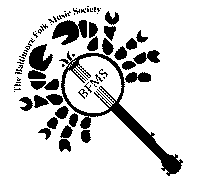BFMS Behavior Policy
The Baltimore Folk Music Society welcomes everyone to enjoy our community dances. Our goal is to provide a safe, comfortable, and fun experience for all.
BFMS wants to make every dancer feel welcome and part of our community. Dance etiquette encourages open and friendly behavior, with direct communication with your partner. Anyone may ask anyone to dance, but you are always free to decline, without explanation.
Please consider the safety and comfort level of others; respect your partner's dance style and politely comply with requests to avoid vigorous dance moves or any behavior that makes them uncomfortable on the dance floor.
Behavior that BFMS deems to be inappropriate will not be tolerated.
If you experience behavior that is uncomfortable or offensive, please tell someone at the gate or a board member. If you have any concerns or questions regarding dance behavior, please address them to dance organizers, board members (several BFMS board members attend each dance), or e-mail us at president@bfms.org.
BFMS Policy on Dancers who Exhibit Inappropriate Behavior
We recognize that all dancers occasionally make a mistake, resulting in inadvertent inappropriate behavior. We also recognize that some dancers behave inappropriately more often than others, creating a higher probability of injury or insult to their fellow dancers. This policy is not aimed at such accidental mistakes. This policy is intended to address the dancer who repeatedly acts inappropriately to the point of endangering or intimidating those around him or her.
We prefer to talk to a dancer who is behaving inappropriately, in order to educate, inform, discuss, and ultimately to alter that dancer's behavior so that the danger to others is minimized. We recognize, however, that not everyone is willing to listen or willing to change his or her behavior for the safety or comfort of others. This official policy is intended for those dancers.
(1) If we are made aware of a dancer who acts inappropriately with other dancers, we will take some action. Our first action may be very casual; we may choose to simply speak to the dancer about the inappropriate behavior.
(2) If the problem seems to be ongoing, or if we receive repeat complaints from others about a specific dancer, or if we observe dangerous and/or reckless behavior, then we will set in motion a three-step process.
(b) If needed, we will later hand to the person in question a second written sheet entitled "Final Warning" to indicate our concern about the inappropriate behavior and the lack of change of that behavior. A copy of the Final Warning will be initialed by the dancer receiving it and will be kept in our files.
(c) If needed, we will later hand to the person in question a third written sheet entitled "Notice of Refusal to Admit" to indicate that we will no longer admit that person to the dance. A copy of the Notice of Refusal to Admit will be initialed by the dancer receiving it. A copy will be kept in our files . This decision will be effective for at least six months, and the expiration date of the ban, if any, will be written on the sheet. After the ban has expired, the dancer may apply to us for re-admission to the dance on a probationary basis.
(3) If a dancer is readmitted to the dance after being banned, we will no longer use a three-step process. We will inform the dancer in question that a single complaint may result in immediate renewal of the ban, and issuance of a "Notice of Refusal to Admit," which ban may be permanent. A copy of such a reissued Notice of Refusal to Admit will be initialed by the dancer receiving it. A copy will be kept in our files.
(4) If a dancer refuses to initial a copy of any Warning or Notice, that person will immediately be asked to leave the dance, and an immediate Notice of Refusal to Admit with a notation regarding the dancer's refusal to initial the copy will be kept in our files.
(5) If a dancer has been refused admittance to a dance but enters the dance, we reserve the right to call the Police, who will escort that person from the premises.

